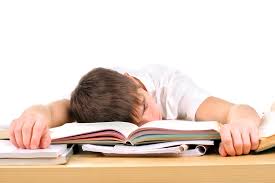The life of a high school student is a messy combination of exams, extracurriculars, and expectations. For many students, there is a constant pressure to participate in the “authentic” high school experience, which usually includes some mixture of sports, theater, volunteering, work, parties, or just hanging out. The time that is not spent engaging in such activities is often occupied by studying for tests and completing homework. As April vacation concludes and finals and AP exams draw ever closer, it is important to investigate the inadequate amount of sleep that most high schoolers are getting and the adverse effects that they are suffering as a result.
In my high school experience, I have met very few people who consistently sleep for at least eight hours every night, which studies have shown is the bare minimum for teenagers to function best. While sleep is often disregarded due to school obligations, it is sometimes by choice. Even on nights when students have very little homework, many will voluntarily stay up late reading, playing video games, or watching television. There are clear consequences to this approach.
A significant number of students at Marblehead High School, myself included, regularly drink coffee just to stay awake during school hours. Many fall asleep anyway. During first block, students are almost always groggy and unresponsive, and several of them can be seen with their heads on their desks throughout the day. Numerous studies indicate that sleep deprivation adversely affects students’ grades, their day-to-day lives, and even their mental stability. The question remains: is there a way to fix this, and if so, how?
This April vacation, I embarked on several college tours at universities throughout New England. As in high school, students in these academic environments often do not get a healthy amount of sleep each night. At one university, the tour guide, who was also a student at the school, described her experience taking a class entitled “The Psychology of Sleep.” Throughout the course, she learned in depth about the psychological effects of sleep and how receiving very few hours per night can significantly impair one’s mental state and performance in school. She then resolved to squeeze at least eight hours of sleep into her schedule every night, a feat that she has accomplished ever since and one that, according to her, has drastically improved her quality of life and ability to meet the expectations of the university.
This student’s experience affirmed my belief that making sleep education more widespread will significantly increase the average number of hours of sleep for teenagers. Ignorance has been a central theme of negative trends in the past including smoking, excessive drinking, and exposure to radiation, all of which people participated in because they were not aware of any reason not to. We, as students, simply have not learned about how important sleep truly is. Just as it caused millions to quit smoking in the 1970s, more widespread education will likely increase test scores and lower rates of depression among students as they learn just how much they have been hurting themselves and their long-term prospects through sleep deprivation.

